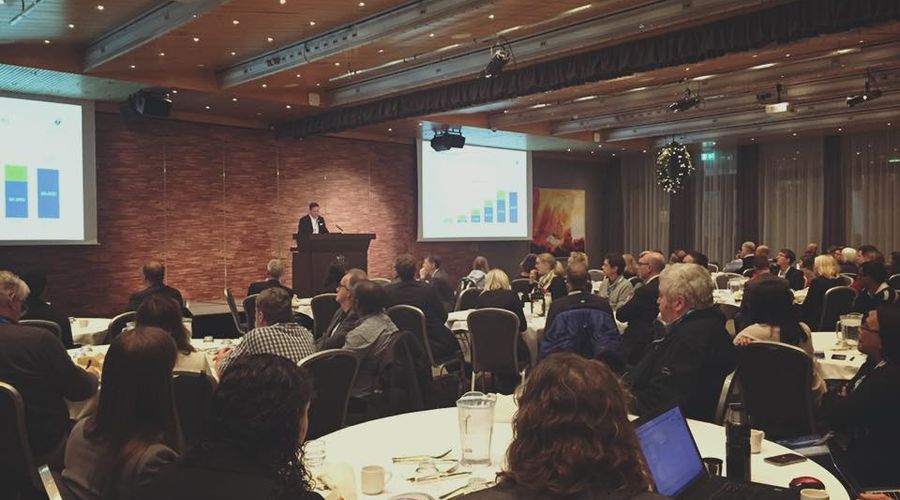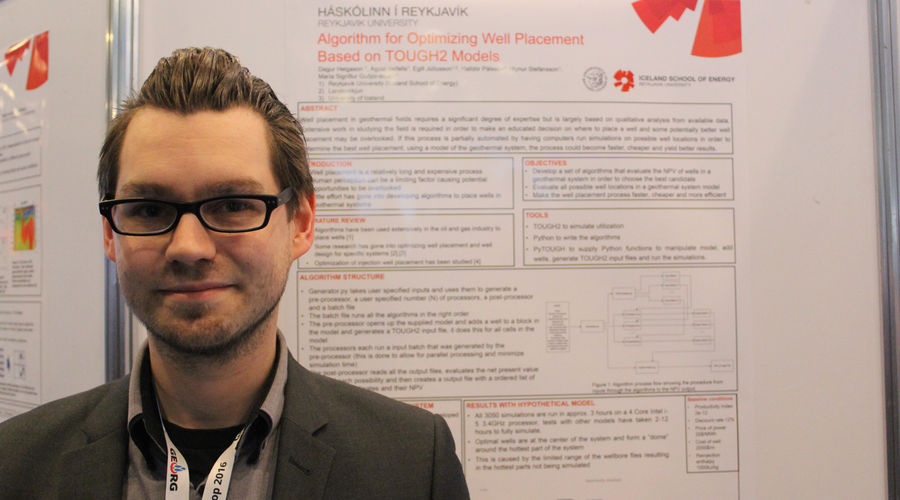ISE experts and affiliates at the GEORG Geothermal Workshop 2016
An overview of ISE's participation in the first GEORG Geothermal Workshop
REYKJAVIK, November 29 - GEORG is a cluster initiative
founded in Iceland in 2009 with the aim to create a platform for industry and
academic parties to join forces. 22 partners, including all main education and
research organization, energy companies, engineering firms and start-ups active
in the Icelandic geothermal sector, come together with the intention to
strengthen research and development and foster innovation in the geothermal
energy field. The first Geothermal Workshop was held to highlight both
achievements from GEORG's
initiatives and give an outlook on upcoming projects and new innovations in the
geothermal sector. Around 60 projects were presented, covering all aspects of
geothermal energy utilization: upstream – the
nature of the resource, mid-stream –
harnessing and production, and downstream – diversified
utilization, as well as the underlying theme of cross cutting topics focused on
sustainability, social benefits and innovation. At this workshop, well regarded
experts in the Icelandic geothermal industry was present, several ISE
professors and affiliates among them.
Here we will give the reader a brief overview of their contributions, past and ongoing research projects.

Guðrún Sævarsdóttir, the dean of Reykjavik University's School of Science and Engineering and board member of GEORG, participated in two sessions during the two day workshop. On Thursday during a midstream session, she presented her research on the utilization of chloride-rich super-heated steam from the IDDP-1 well drilled at Krafla, highlighting the issues connected to utilizing this highly corrosive geothermal steam. On Friday she was joined by Hólmfríður Sigurðardóttir, the head of environmental affairs at ISE partner organization Reykjavik Energy (Orkuveita Reykjavikur) in a panel discussion on the smart geothermal future.
Assistant professor the School of Science and Engineering and member of the Geothermal Operations Research Group at ISE, María Sigríður Guðjónsdóttir, presented two projects on Thursday. First, she presented a thermoeconomic analysis of geothermal power cycles for IDDP-1 chloride mitigation. In the second lecture, she then proceeded to present her PhD thesis on assessing relative permeabilities in geothermal reservoirs using theoretical relations, laboratory measurements and field data.
Among students presenting their research during sessions, Vijay Cauhan, a PhD student at Reykjavik University and current MSc thesis supervisor of another ISE student, presented the current state of his PhD research studying the modelling of superheated steam flow in dispersed phase. Arna Pálsdóttir, a PhD student at Cornell University, presented her research on extracting metals from Icelandic geothermal fluids with a special focus on lithium extraction from the Reykjanes Geothermal system.
Several other ISE affiliated talks were given during
sessions. Our partners at ÌSOR
were well represented with a lecture from Guðni
Axelsson among others who gave a presentation about a renewability assessment
of the Reykjanes Geothermal System and Bastien Poux who presented a 3D model of
the Hellisheiði geothermal field. Halldór Pálsson,
from University of Iceland and member of the Geothermal Operations Research
Group, presented an overview of the activities of Operations Research Group in
Geothermal Engineering conducted with several of ISE affiliated professors.
During the closing session Friday afternoon, Hildigunnur Thorsteinsson, the
Managing Director of Research and Development at Orkuveita Reykjavikur and current
board member of ISE, gave one of the closing keynote speeches which highlighted
the challenges of global climate change and the opportunity that Iceland´s geothermal experience can offer.
Alongside these speakers during the workshop's sessions, three current ISE students presented their research projects on posters.

